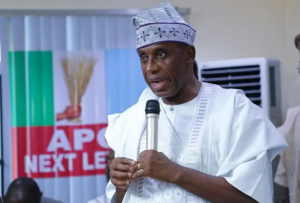
About 60 members of Nigeria’s House of Representatives are advocating for a shift from the current presidential system to a parliamentary form of government. Led by Wale Raji of Lagos State’s All Progressives Congress, these lawmakers aim to amend the 1999 Constitution to facilitate this transition.
Their proposal, titled ‘The Bills proposing constitutional alterations for a transition to parliamentary system of government,’ emphasizes the need to reduce government costs and promote robust policy debates. Sponsored by House Minority Leader Kingsley Chinda and 59 others, the bill was introduced during a plenary session in Abuja.
The lawmakers, representing various party affiliations, argue for the adoption of a parliamentary system at the federal, state, and local government levels. They highlight the accountability and responsiveness inherent in this system, contrasting it with the perceived flaws of the current presidential model.
Abdulssamad Dasuki, speaking on behalf of the sponsors, lamented the collapse of the First Republic and the subsequent adoption of a presidential system with military undertones. He pointed out the high cost of governance and the concentration of power in the executive as major drawbacks of the current system.
The proposed changes include replacing the President with a Prime Minister elected from the legislature and shifting the election of governors and local government chairpersons to voting within their respective legislative bodies. These alterations aim to streamline administration, foster collaboration between branches of government, and enhance accountability.
The lawmakers stress the importance of public engagement and responsible leadership in shaping Nigeria’s governance system. They hope to spark national dialogue, facilitate expert analysis, and encourage informed decision-making regarding the proposed constitutional amendments.
While acknowledging the lengthy process ahead, with a target year of 2031 for implementation, the lawmakers remain optimistic about the prospects of their initiative. They express confidence that their proposal, driven by the nation’s best interests, will pave the way for a more effective and accountable system of governance in Nigeria.






Be First to Comment